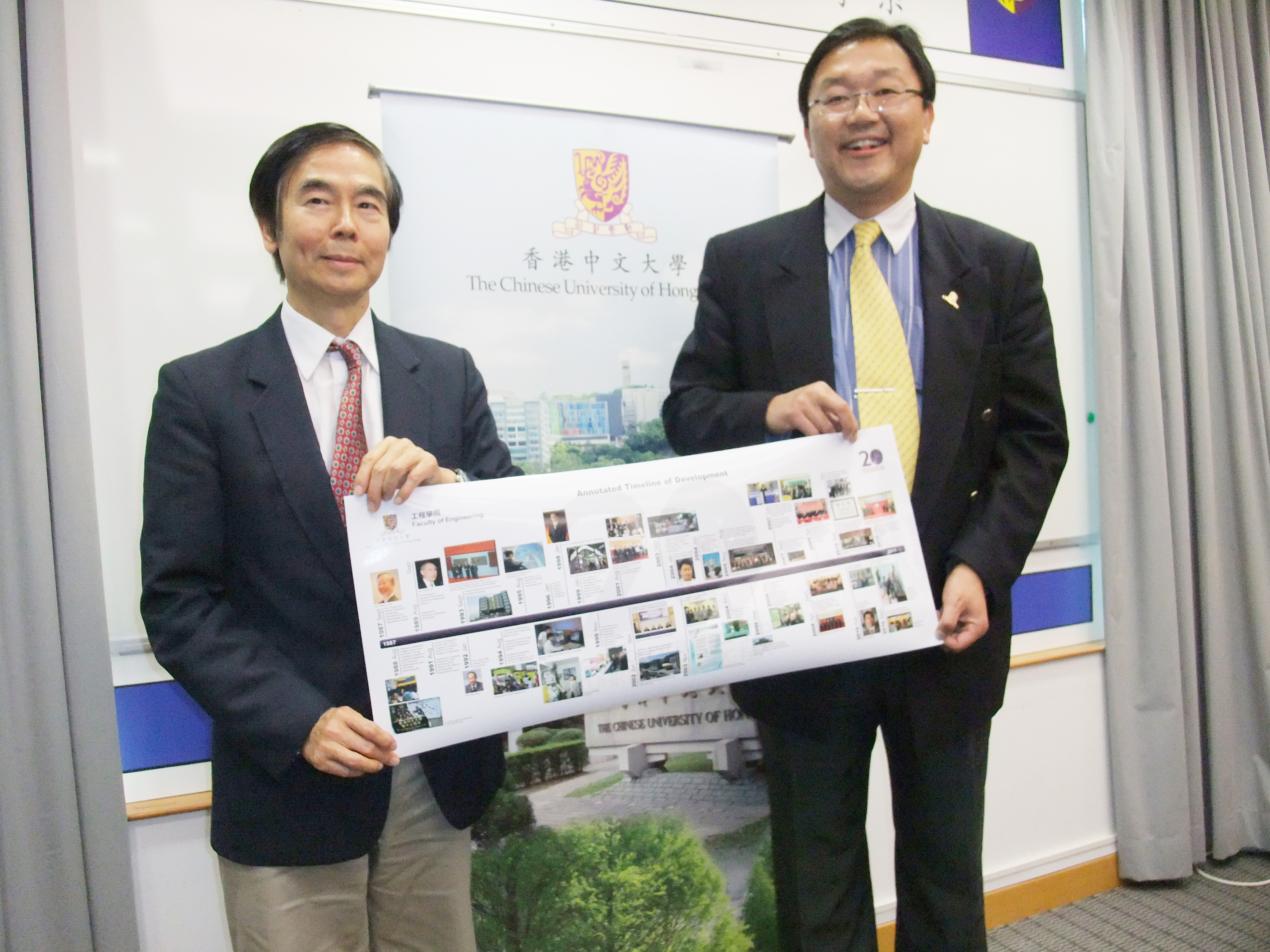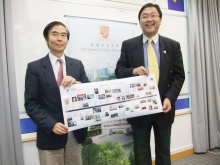CUHK
News Centre
CUHK Faculty of Engineering Launches New Focus Areas to Celebrate 20th Anniversary
The Faculty of Engineering at The Chinese University of Hong Kong (CUHK) is celebrating its 20th anniversary this year. Six new focus areas catering to the needs of society are launched: biomedical engineering, energy technology, cyber security, financial engineering, nanotechnology and systems integration — electronic / photonic packaging. The Faculty has also allocated additional resources to roll out new programmes and hire academic and research staff in order to strengthen its position as a leading engineering school in Asia.
Prof. C.P. Wong, world-renowned scholar in electronic engineering, was appointed Dean of Engineering in 2010. Committed to nurturing the young, Professor Wong is keen on contributing to engineering education in Hong Kong. Professor Wong furthered his education in the US after finishing secondary school in Hong Kong. He observed that many top students in the US choose to study engineering, and many talented engineers enjoy hugely successful careers. He aspires to lead the CUHK Engineering Faculty to become one of the top engineering schools worldwide, to offer an all-rounded engineering education, to attract top undergraduate students, and to provide high quality research training for graduate students.
In recent years, the Faculty has actively organized experiential learning programmes for local secondary school students with the aim of enhancing their interest in engineering studies. The programmes allow them to learn more about the Faculty's programmes of study as well as the prospects of an engineering education. Students are also given the chance to visit the Faculty's laboratories. Professor Wong remarked, 'Engineering education provides all-round training for students, and our graduates have bright futures. Many Chinese leaders are engineers by training. They and Nobel Prize laureate, our former Vice-Chancellor Prof. Sir Charles Kao, are excellent examples of outstanding engineers.' With tremendous potential for high technology development in mainland China, Professor Wong believes that Hong Kong students who are proficient in Putonghua, Cantonese and English will enjoy a distinct edge in pursuing their careers on the mainland as their skills and talent will be in high demand for the development of high technology industries there.
An experienced educator, Professor Wong knows that government policies and the resources a government provides play an important role in the development of engineering technology. The development of the technology sector in Hong Kong is lagging far behind that of neighbouring regions such as the mainland, Japan, Taiwan and South Korea. In conjunction with the deans of engineering of four other local universities, Professor Wong proposed the formation of a permanent Technology Development Council in the Hong Kong Government. This council will report to the Chief Executive and give advice to the government on technology matters.
Professor Wong explained, 'With a full spectrum of high value added technology industries, Hong Kong's economy will have a chance to grow to its fullest potential as a knowledge-based contender. This will also add diversity to the currently monotonous finance- and banking-based economy. Hong Kong, with a number of top engineering schools in China, should lead the high-tech development of the Pearl River Delta Region. The growth of the technology sector will help to solve the problems brought by an unbalanced economy and by unemployment.' Professor Wong will lead the Faculty in fundamental and application research, enhance collaboration between institutes, and stride forward with the nation.
To celebrate the Faculty's 20th anniversary, a series of activities will be organized for staff, alumni and students to promote engineering education and share achievements made in the past two decades. Details of the activities will be announced soon.
Six focus areas of development:
Biomedical Engineering: Hong Kong is one of the most populous regions in the world, and the aging population has led to an increasing demand for medical services. As the training of medical staff in both skills and knowledge is relatively mature, medical advancement in recent years has been focused on technology and apparatus.
Energy Technology: Global warming is getting more serious and many industries are trying to seek solutions that will enhance energy efficiency. Developing green energy and programmes that streamline the supply chain are areas that engineers can contribute to help industries save resources while tapping new ones.
Cyber Security: As internet transaction and communication become increasingly popular, issues of internet security, for instance, risk of information leakage in communications between national leaders, has become more critical and need urgent attention.
Financial Engineering: The collaboration of engineering and finance is instrumental to Hong Kong's development as a financial hub in the region. The scientific approach of engineering can solve many difficulties faced by the finance industry. New research areas include incorporating scientific calculation into risk management, optimization of transaction, and developing secure and accurate electronic transaction.
Nanotechnology: There are numerous applications for nanotechnology, as the technology allows us to undertake delicate processes and manufacture tiny products. New materials developed using nanotechnology can replace certain environmentally unfriendly materials currently in use, thereby helping to protect our environment.
Systems Integration — Electronic and Photonic Packaging: The technology involves putting electronic components to form high-tech electronic products, such as mobile phones, lap top computers and all other consumer devices and high performance computers. All our five Engineering departments will be involved in this initiative. For instance, Departments of Computer Science and Engineering, and Electronic Engineering will involve in system design; Department of Mechanical and Automation Engineering will address reliability testing and thermal management; Department of Systems Engineering and Engineering Management will ensure all manufacturing logistics; and Departments of Electronic Engineering and Information Engineering can focus on system utilization and manufacturing. The Faculty takes the initiative to work with and up-grade those thousands of manufacturers in the Pearl River Delta region.





